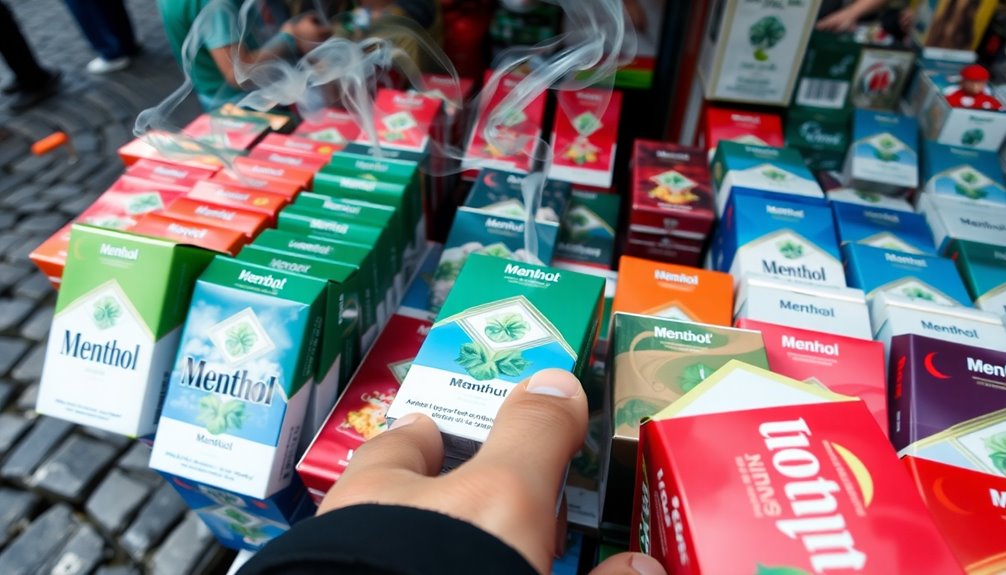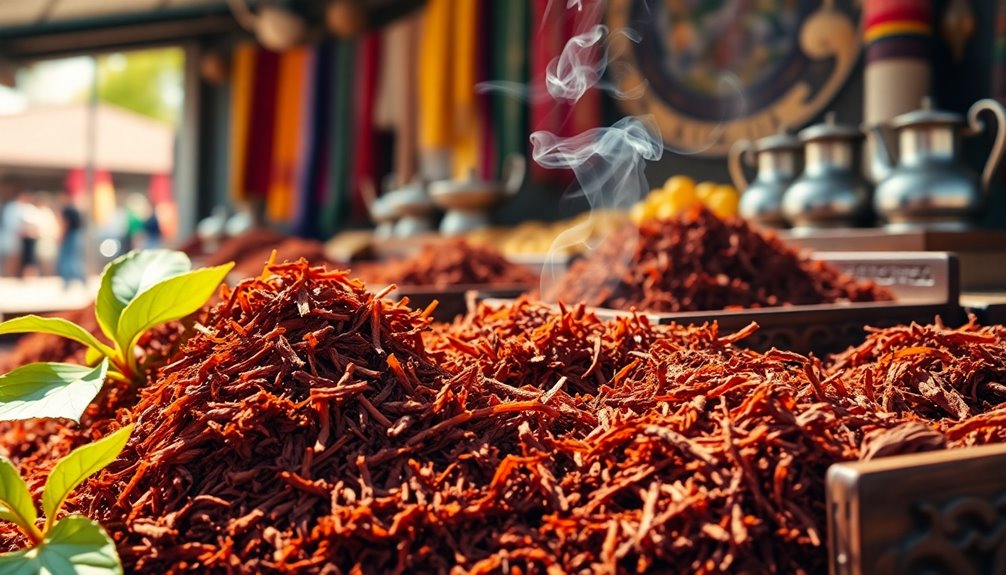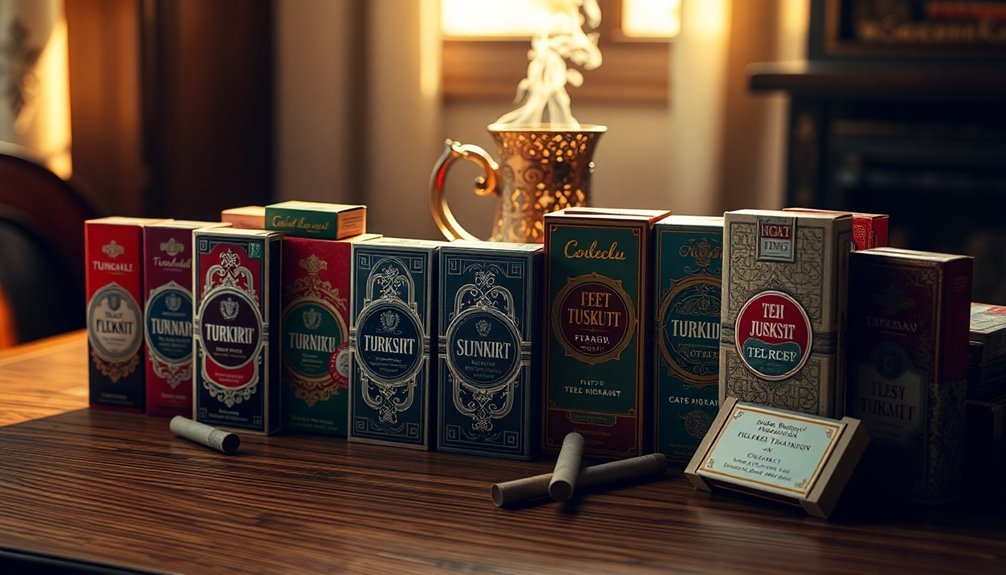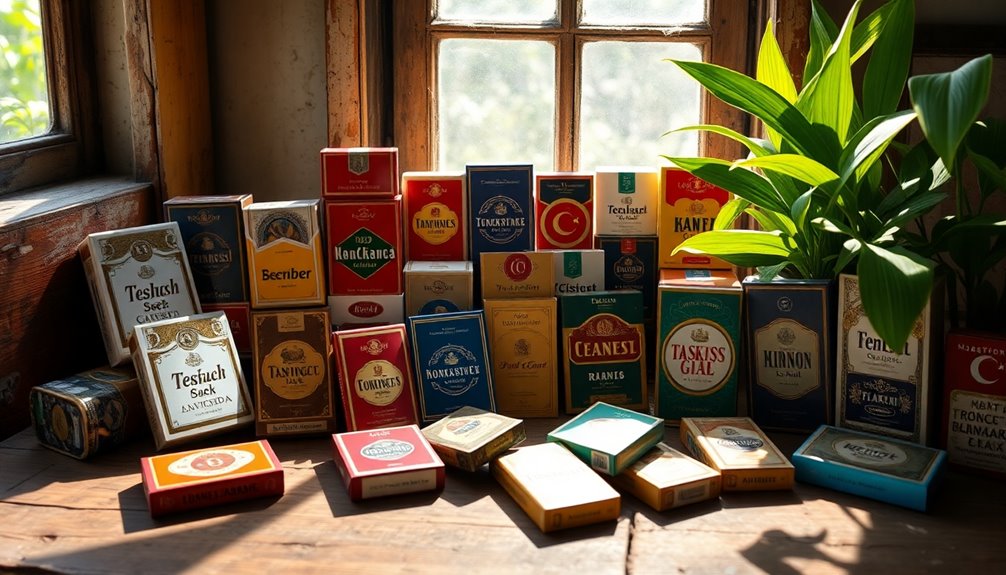Menthol cigarettes are making a comeback in Turkey, despite the country's ban effective since January 2022. Many smokers still crave the flavor, leading to the rise of alternatives like menthol balls, which are cleverly marketed online. With around 30.5% of adults smoking, there's a noticeable demand for these products. The tobacco industry adapts too, using engaging strategies to appeal to younger consumers. Although menthol smoking poses serious health risks, the trend continues. If you want to explore how this shift is impacting the market and health in Turkey, stick around for deeper insights.
Key Takeaways
- Turkey's ban on menthol cigarettes took effect in January 2022, aiming to reduce youth smoking by eliminating flavored tobacco products.
- Despite the ban, demand for menthol flavors persists, with consumers turning to alternatives like menthol balls marketed online.
- Approximately 30.5% of Turkey's adult population smokes, with significant gender disparities in smoking rates, particularly among men and youth.
- The Turkish tobacco market is dominated by multinational companies, and production has declined due to increasing taxes and regulations.
- Menthol smoking poses serious health risks, including heightened chances of addiction, cardiovascular issues, and respiratory diseases, prompting the search for safer alternatives.
Background of the Menthol Ban

Although menthol cigarettes have been popular for years, Turkey took a bold step in 2015 by becoming the first country to impose a comprehensive ban on flavored tobacco products, including menthol. This decision aimed to tackle the growing appeal of menthol cigarettes among children and adolescents, making it harder for them to initiate smoking. By 2020, the ban was fully implemented, covering the manufacture, import, distribution, and sale of these products.
The ban also prohibited aroma and taste additions to packaging, reinforcing the message that smoking shouldn't be appealing. Turkey's efforts were part of broader tobacco control measures, aligning with global initiatives to restrict flavored tobacco products. Menthol cigarettes were known to be easier to smoke and harder to quit, contributing to long-term health issues for many users. Research has shown that menthol cigarettes are particularly appealing to youth, which underscores the importance of the ban in protecting this vulnerable demographic.
The initiative sought to reduce the attractiveness of smoking, particularly among youth. As other countries observed Turkey's move, they began to consider similar bans, recognizing the potential health benefits.
Current Smoking Rates in Turkey

Turkey's comprehensive menthol ban marks a significant effort to curb smoking prevalence, which remains a pressing public health issue. Currently, about 30.5% of the adult population are smokers, translating to around 19.1 million individuals. While smoking rates have dropped from 39% in 2000 to a projected 22% by 2025, the numbers still reflect a substantial challenge. Additionally, 85,332 deaths annually in Turkey are attributed to tobacco smoking-related diseases.
When you look at gender-specific rates, 42.8% of men and 18.9% of women smoke. Men have seen a decrease from 60% in 2000 to an anticipated 34% by 2025, while women's rates are also declining.
For youth aged 13-15, 17.9% currently smoke, with boys at a higher rate of 23.2% compared to 12.1% for girls.
The health impacts are dire, as nearly 85,000 Turks die each year from smoking-related diseases. With significant economic burdens tied to tobacco use, Turkey's smoking prevalence remains a key concern.
As these rates continue to decline, the emphasis on public health policies will be crucial in shaping future outcomes.
Internet Sales of Menthol Products

Many people might be surprised to learn that despite a ban on menthol cigarettes in Turkey, the online market for menthol products remains robust. You'll find 37 brands of menthol balls actively marketed through various e-commerce platforms.
While only 12 brands maintain individual websites, the other 25 rely on major e-commerce outlets to reach you. Some brands even sell menthol balls in one-kilogram bags, catering to bulk buyers.
These brands cleverly promote their products through videos that demonstrate how to inject menthol balls into regular cigarettes, maintaining the appeal of menthol.
In total, three large e-commerce sites offer a whopping 1,485 different flavored menthol balls under the category of air refresher, while another site lists 88 varieties under tobacco bags. This categorization helps sidestep regulations, allowing easy access for consumers.
The widespread internet sales of menthol balls not only circumvent the ban but also keep the menthol culture alive. This accessibility to menthol products may lead to increased exposure time, which results in higher nicotine absorption, making it harder for users to quit.
As tobacco companies exploit loopholes, it becomes clear that effective regulation needs to address online sales comprehensively to truly mitigate the smoking trend among vulnerable populations.
Regular monitoring and updates are essential to close these gaps.
Marketing Strategies for Menthol Balls

You might be surprised to see how aggressively brands market menthol balls, especially given the existing bans on menthol cigarettes.
They utilize various e-commerce websites, individual brand sites, and social media to reach their audiences. With 37 brands in the market, each employs unique strategies to capture attention.
You'll find menthol balls categorized under air refreshers and tobacco bags, cleverly bypassing regulations. In fact, this clever positioning is similar to the strategies employed by multinational tobacco companies that effectively target youth.
Promotional tactics include engaging video demonstrations that show how to inject menthol balls into cigarettes, making them more appealing.
Brands also offer flavor variations, bulk sales in one-kilogram bags, and even menthol ball liquids for roll-your-own tobacco.
This variety targets young consumers, particularly those drawn to the sensory appeal of menthol's cooling effect.
Health Impacts of Menthol Smoking

While brands cleverly market menthol balls to attract consumers, the health impacts of menthol smoking paint a troubling picture. Menthol masks airway pain and irritation, making you feel like you're breathing easier. This deceptive comfort can lead you to inhale more deeply and hold smoke in your lungs longer, exposing you to higher levels of dangerous chemicals. Additionally, studies show that over 80% of Black American smokers use menthol cigarettes, highlighting the targeted marketing strategies of the tobacco industry.
Menthol cigarettes significantly increase your risk of addiction, making it harder to quit. You might feel a stronger urge to stop smoking, yet menthol smokers often find it more challenging to succeed in quitting. Additionally, menthol's anesthetic properties can hide early warning signs of respiratory issues, leading to delayed health intervention.
The cardiovascular risks are also alarming. Smoking menthol cigarettes raises your odds of stroke, especially for women, and can increase carotid artery stiffness.
Despite their allure, menthol cigarettes are linked to the same diseases as non-menthol ones, including cancer and respiratory diseases. Even second-hand smoke from menthol cigarettes poses serious health threats.
Ultimately, the marketing of menthol cigarettes misleads you, while the reality is a heightened risk of serious health problems.
Demographics of Menthol Users

Menthol cigarette users in Turkey display distinct demographic trends that highlight the complexity of tobacco consumption. If you look closely, you'll notice that the highest proportion of daily smokers among men is found in the 35-44 age group, with over 50% being regular smokers. For women, the trend mirrors this, as about 23% fall into the same age bracket.
While tobacco use prevalence among men peaks in the 25-34 age group, it shifts slightly in 2016, favoring the 35-44 range. It's important to recognize that the lowest tobacco use is in those aged 75 and over.
Among youths aged 13-15, you'll see 17.9% are current tobacco users, with 23.2% being boys and 12.1% girls. Recent data shows that smoking rates among younger adults are significantly higher compared to older demographics.
When you consider gender distribution, you'll find that men consistently outnumber women in smoking prevalence, with 44.8% of males and 18.1% of females aged 15 and above being current smokers in 2019. This gender gap is evident across all age groups, further complicating the demographic landscape of menthol cigarette users in Turkey.
Tobacco Industry Landscape in Turkey

The tobacco industry in Turkey reflects the shifting patterns of consumption and regulation that have shaped the market landscape. As the world's 10th biggest tobacco producer, Turkey accounts for 1.2 percent of global tobacco production, primarily focusing on Oriental tobacco, which makes up 96% of its output. However, since the 1980s, a market-oriented transformation has led to a decline in domestic production from 160,000 tons in 2002 to a mere 62,000 tons by 2015, while imports surged. Turkey accounts for 4% of global tobacco production, showcasing its significant role in the international market.
Multinational companies like Philip Morris, JTI, and British American Tobacco dominate the market, utilizing aggressive advertising and pricing strategies. The 2008 privatization of TEKEL further solidified their control. With increasing taxation and regulatory changes, including Law No. 4733, the market environment has drastically shifted, impacting local farmers and reducing their numbers by 65 percent. Despite a forecasted lower growth rate, tobacco sales in Turkey are expected to rise, driven by improved economic conditions and increased product variety. As you navigate this landscape, it's essential to understand how these dynamics influence not only market trends but also consumer choices, including the rising popularity of menthol cigarettes.
Alternatives to Traditional Cigarettes

Alternatives to traditional cigarettes have gained popularity as smokers seek options that might seem less harmful or help them quit. One popular choice is herbal and clove cigarettes, also known as Kreteks. These contain 60%-70% tobacco mixed with cloves and flavorings. Many perceive them as safer, but they still deliver tar and carcinogens, posing risks to both smokers and those around them.
Nicotine replacement products are another avenue. Chewing gum, available in various flavors like fruit and mint, can help manage cravings, though excessive chewing may lead to nicotine overdose. Sugar-free options keep your mouth busy and can reduce the urge to smoke.
E-cigarettes, despite being banned in Turkey, are widely used as an alternative. Many people acquire them through informal channels, making them highly addictive due to their concentrated nicotine salts. Moreover, vaping and hookahs pose significant health risks and contain cancer-causing chemicals, further complicating the perception of safer alternatives.
Hookahs are also seen as less harmful due to water filtration, but they still contain cancer-causing chemicals.
Other alternatives include cigars, chewing tobacco, and dissolvable tobacco products. Ultimately, while these alternatives may seem appealing, they don't eliminate the health risks associated with tobacco use.
Future of Menthol Cigarettes in Turkey

With the ban on menthol cigarettes in Turkey effective since January 2022, the landscape of tobacco consumption is shifting. You may notice that traditional menthol products are disappearing from store shelves, but that doesn't mean the demand for menthol flavors has vanished. Many consumers are now turning to alternatives like "menthol balls," which allow them to inject menthol into regular cigarettes. This adaptation indicates a persistent desire for menthol experiences, even in the face of regulatory challenges.
As you navigate this new environment, keep in mind that the ban aims to reduce smoking frequency and nicotine dependence. However, some smokers may still seek menthol products through illicit or online sources. This shift in consumer behavior could lead to changing patterns in tobacco consumption in Turkey. Notably, the average unit prices for tobacco have increased significantly, which may also influence consumer choices and behaviors in the market.
Despite the ban, overall tobacco sales are expected to grow, driven by economic conditions and product variety. Traditional retailers will likely continue to dominate the market, including non-menthol tobacco products. As stricter tobacco control measures spread globally, the future of menthol cigarettes in Turkey may evolve further, reflecting both regulatory changes and consumer preferences.
Frequently Asked Questions
How Do Menthol Balls Affect the Taste of Regular Cigarettes?
Menthol balls can significantly enhance the taste of regular cigarettes.
When you crush a menthol ball, it releases a cooling sensation and a minty flavor, which masks the harshness of tobacco smoke. This makes the smoking experience smoother and more enjoyable for many.
You might find that the menthol flavor not only refreshes your palate but also encourages deeper inhalation, making the act of smoking feel less irritating overall.
Are There Any Legal Consequences for Selling Menthol Balls?
Yes, there can be legal consequences for selling menthol balls, especially if they're marketed as tobacco products.
Since Turkey implemented a ban on menthol in tobacco, authorities actively enforce these regulations.
If you're caught selling or distributing menthol balls that circumvent this ban, you might face fines or other penalties.
It's essential to stay informed about local laws to avoid any legal issues related to these products.
What Are the Age Restrictions for Purchasing Menthol Balls Online?
When you're looking to purchase menthol balls online, you won't find specific age restrictions mentioned.
Generally, the age restriction for tobacco products in Turkey is 18, but online sales can be challenging to regulate.
While sellers are expected to comply with existing laws that prohibit selling to minors, enforcement isn't straightforward.
How Can Menthol Balls Influence Smoking Cessation Efforts?
Menthol balls can complicate your smoking cessation efforts. They mask unpleasant sensations associated with smoking, making it easier to continue the habit.
You might find that their cooling effect provides temporary relief, reducing your motivation to quit. Additionally, if you perceive menthol as more socially acceptable, you may feel less pressure to stop.
Are There Any Health Benefits Associated With Menthol Cigarettes?
There aren't any health benefits associated with menthol cigarettes.
While menthol may numb airway irritation and suppress coughing, it doesn't reduce smoke toxicity or offer any actual health advantages.
In fact, it can mask warning signs of respiratory issues, making it harder for you to recognize the harm smoking causes.
Ultimately, menthol cigarettes can lead to increased nicotine addiction and complicate efforts to quit smoking, posing serious health risks without any benefits.
Conclusion
In conclusion, the rise of menthol cigarettes in Turkey highlights a complex interplay of consumer behavior and industry tactics. As traditional smoking rates decline, the appeal of menthol products is evident, especially among younger demographics seeking alternatives. The health implications of this trend can't be ignored, and it's crucial to stay informed about the evolving tobacco landscape. As you navigate these choices, consider the impacts on your health and the broader community.










